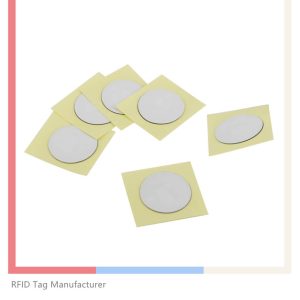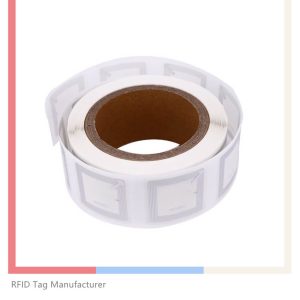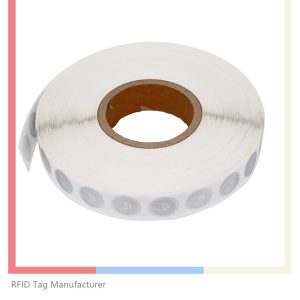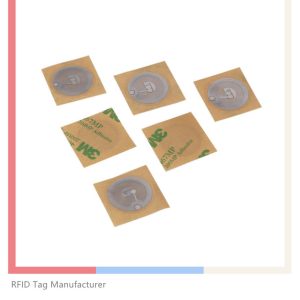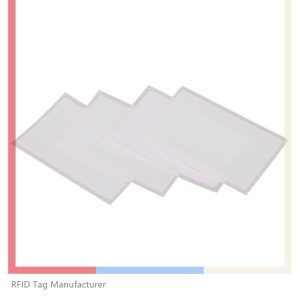RFID Label manufacturer


RFID Tag Maker
High-quality RFID label
Our RFID labels are available in a variety of sizes and form factors to suit different applications. We offer customization options, such as printing logos or text on the label, as well as custom antenna designs to fit the label size you require. Our labels are designed and made to meet the highest quality standards, ensuring they work well and last in even the toughest conditions. We can even manufacture custom RFID tracking labels that meet ISO 9001-2000 process standards to ensure quality and consistency.
RFID Tag Maker: Your Professional RFID label Manufacturer
We offer a wide selection of in-stock RFID labels in various sizes and form factors, as well as customization options such as printing logos or text on the label and designing custom antenna sizes to fit your specific needs. Our labels are designed and made to meet the highest quality standards, ensuring that they work well and last even in the toughest conditions. We also manufacture custom RFID tracking labels that meet ISO 9001-2000 process standards to ensure quality and consistency.
Our RFID labels are commonly used in supply chain management, inventory control, and asset tracking, as well as in other applications such as access control and security. In addition, our RFID labels can be used for seed-to-sale traceability in the cannabis, CBD, and hemp industries, to prevent counterfeiting, and to enhance the reliability and security of pharmaceutical, retail, and healthcare products.
At our company, we offer complete customization and quality assurance to ensure that our RFID labels meet your specific needs and requirements. We have delivered thousands of RFID systems for brands across the country and can do the same for your brand.
Different Frequency of RFID Labels
RFID label come in various sizes and shapes, depending on the item they will be attached to. we can be customized to include a company logo or other branding elements. These tags operate at different frequencies, depending on the RFID reader used. Some common frequencies include 13.56 MHz, and 900 MHz.
Need a quote? Have a question? Our customer care support takes less than a day to answer. Contact us today for a free quote.
Mafare® ultralight- ISO/IEC14443-A 13.56Mhz
Mifare® ultralight RFID label conform to ISO|IEC 14443-A
Mifare® ultralight is intended to provide an appropriate RFID label solution for high-volume applications at a lower cost.
NXP Mifare® classic 1k EV1 RFID label -ISO|IEC 14443-A
Mifare Classic ® RFID Label is the most well -know RFID smart ticket application. It is compliance with ISO/IEC 14443 TYPE A,support read/wriet.
NXP Ntag® NFC label -ISO|IEC 14443-A
Cost-effective NFC label solutions that utilize NXP NTAG® technology are ideal for a wide range of applications, from simple NFC applications like mobile payments and loyalty programs, to those that require enhanced security features like product authentication and anti-counterfeiting.
Long Range NFC label - ICODE® Slix-ISO15693 -NFC FORUM TAG TYPE 5
As we all know, NFC label, NFC tag is a short-range label, but ISO 15693 is a long-range NFC label, its reading distance can reach 1.5 meters. I CODE series of tags are NFC FORUM TAG TYPE 5 STANDARD
ST25TV02K RFID label -ISO15693 -NFC FORUM TAG TYPE 5
ST25TV02K RFID label is based on ISO/IEC 15693 and NFC forum tag Type 5 standard, read distance up to 1.5 meters.
UHF RFID label -Long range RFID tag
UHF RFID labels are a type of radio frequency identification (RFID) label that operates at the frequency range of 860-960MHz. This higher frequency allows for a superior transmission range of up to 12 meters or 40 feet, making them ideal for tracking and managing inventory and assets in large-scale environments.
Table of Contents
What is RFID label ?
RFID (Radio-Frequency Identification) labels, also known as RFID stickers or RFID adhesive labels, are widely used in various industries such as hospitals, research facilities, and IVF labs for various purposes such as record-keeping, access control, inventory tracking, patient and sample management, and more.
An RFID label typically consists of three main components: an integrated circuit that stores and processes information, an antenna for transmitting and receiving signals, and a means of collecting DC power from the reader signal. The tag information is stored in non-volatile memory and can either be fixed or programmable, depending on the application.
RFID labels can be either read-only, with a factory-assigned serial number that acts as a key into a database, or read/write, allowing system users to write object-specific data into the tag. Field programmable tags may be write-once, read-multiple, while “blank” tags may be written with an electronic printer encoder.
Today, many companies are using smart labels that combine printed barcodes and human-readable information with embedded RFID circuitry. This enables organizations to optimize the latest tracking technology and streamline their operations. Overall, RFID labels are a powerful tool that enables accurate and efficient data collection and management in various industries.
How RFID Labels Work ?
RFID labels work by using a combination of three main components: an integrated circuit (IC), a means of collecting DC power from the reader signal, and an antenna for receiving and transmitting the signal. The IC stores and processes information that modulates and demodulates radio-frequency signals, and can include either fixed or programmable logic for processing the transmission and sensor data. The RFID label can be either read-only, where it has a factory-assigned serial number that is used as a key into a database, or read/write, where object-specific data can be written into the tag by a system user.
When an RFID label is brought within range of a reader, the reader sends a radio signal to the label, which in turn powers the IC and activates the antenna. The antenna then sends the information stored on the label back to the reader via a radio wave. This process is much faster and more efficient than traditional barcode scanning, as multiple RFID labels can be read at once and without requiring a direct line of sight.
Benefits of RFID Labels
There are several benefits of using RFID labels, including:
-
Improved inventory management: RFID labels allow for real-time tracking of inventory, making it easier to know when items are in stock or out of stock.
-
Increased efficiency: RFID labels can be read quickly and accurately, making them more efficient than traditional barcode scanners.
-
Reduced labor costs: RFID labels can be read without the need for manual scanning, which can help reduce labor costs.
-
Enhanced security: RFID labels can be used to track and monitor items, making it easier to detect theft or unauthorized access.
-
Better supply chain management: RFID labels can be used to track items throughout the supply chain, providing greater visibility and control over the movement of goods.
-
Improved patient safety: In the healthcare industry, RFID labels can be used to track patient samples and medications, reducing the risk of misidentification errors.
RFID label applications
RFID labels are becoming increasingly popular in a wide range of industries, from healthcare and retail to logistics and manufacturing. Here are some of the most common applications of RFID labels:
Healthcare
In the healthcare industry, RFID labels are primarily used to reduce misidentification errors and improve supply chain management. RFID tags can be used to track patient samples in real-time, from collection to testing, ensuring that samples are never lost or mislabeled. In addition, RFID labels can be used to send medical alerts to staff and locate valuable samples. RFID thermal labels can also be used to track and monitor workflows in the lab, making them a valuable tool for histology, pathology, and clinical labs.
Retail
Retailers like Wal-Mart, Sam’s Club, Best Buy and others use RFID tags to track their products and sales. RFID technology is now becoming a standard part of the label printing process, and many retailers require suppliers to outfit products with RFIDs. Some brands are also using near-field communication (NFC) labels, a type of RFID technology, to communicate key educational and product-use information with their consumers.
Logistics
In the logistics industry, RFID labels are used for distribution, shipping and receiving, and warehouse operations including case, pallet and cross-docking applications. RFID technology can help improve supply chain visibility and optimize inventory management.
Manufacturing
RFID labels are used in manufacturing for work-in-process tracking, product labeling, product ID/serial numbers, security, and product lifecycle tagging. RFID technology can also be used for fleet management, metal and liquid filled containers, and asset tracking of tools, fixtures, metal parts, returnable containers, chemical drums, and more.
Transportation and Logistics (T&L)
Distribution, shipping and receiving, warehouse operations including case, pallet and cross-docking applications.
Manufacturing
Work-in-process, product labeling, product ID/serial numbers, security and product lifecycle tagging.
Fleet management
Metal and liquid filled containers
Asset tracking
Tools, fixtures, metal parts, returnable containers, chemical drums and more.
Healthcare
Patient ID, specimen, laboratory and pharmacy labeling, document and patient records management.
Asset tracking of wheelchairs, beds, oxygen canisters, IV pumps and medical diagnostic tools.
Retail
Asset tracking of mobile computers, printers, antennas and infrastructure components.
RFID label manufacturers
RFID TAG MAKER is a leading RFID Label manufacturer in the RFID industry with over 2 decades of experience in design and manufacturing. They specialize in creating various RFID label designs for HF, NFC, and UHF applications. Their products are of world-class quality and they offer fast and stable product delivery to their customers.
RFID TAG MAKER boasts top-level inserting and covert equipment for first-class inlay manufacturing, and they have supplied billions of inlays for top-level RFID projects. The company has a reputation for delivering the highest and consistent quality RFID products, which has earned them a loyal customer base.
Furthermore, RFID TAG MAKER has a high-speed production line that can produce up to 1 billion products, making them one of the fastest and most efficient RFID tag makers in the market. Their commitment to quality and efficiency has helped them become a trusted and reliable partner for businesses looking to implement RFID technology in their operations.
RFID label cost
RFID (Radio Frequency Identification) labels are used to store and transmit data wirelessly, making them ideal for a variety of applications such as asset tracking, inventory management, and supply chain management. There are several types of RFID labels available in the market, each with its own unique features and capabilities.
Low Frequency (LF) 125Khz RFID labels have the longest wavelength and are ideal for challenging RF environments with liquids and metal content, such as animal identification and smart key applications. Their read ranges are usually limited to centimeters or up to one-half meter, and tag programming is often set to a unique secure identifier.
High Frequency (HF) 13.56mhz RFID labels and Near Field Communication (NFC) labels operate in the same frequency and have a shorter read range of centimeters to a meter. HF 13.56mhz RFID labels are typically used for healthcare, smart label tracking, ticketing, and library applications where close reads are desired and ideal RF environments cannot be controlled. NFC tags are often used for marketing applications, where a tap to the tag can direct the user to websites, social media, or other NFC marketing applications.
Ultra-High Frequency (UHF) labels are ideal for longer read range applications of 1 to 20 meters, where fast read/write speeds are desired. UHF applications are ideal for item-level visibility where dense tag populations and movement are in play, typical of manufacturing, healthcare, RTLS, asset tagging, and tracking projects.
Dual Frequency (UHF and NFC) tags or labels combine the long-range read/write ability of UHF RFID with the user-level functionality of NFC tags and labels. The result is a multi-function tag that provides the visibility for manufacturing, inventory, and logistics applications and the brand interaction goals of NFC marketing into a single tag with a shared chip that can be read or programmed with a smartphone.
At RFID Tag Maker, we offer a wide selection of in-stock RFID labels that are designed for and tested with Zebra RFID printers and RFID readers. Our RFID labels are designed for use with RFID readers and are stocked in a variety of RFID inlay types and sizes. They are available in paper and PET materials that work on non-metallic surfaces, plastics, or corrugate.
Our high-sensitivity UHF label has a read range of up to 17m in free space, delivering consistent, reliable performance and helping you achieve a better ROI. These advanced RFID labels offer a higher level of reading performance than our general-purpose RFID labels for use where longer ranges are required and feature inlays from leading providers. They provide efficient performance when placed on or near challenging materials, with omnidirectional readability from almost any angle.
We offer RFID labels with standard 128-bit memory inlay with a read range of up to 20m or with enhanced 448-bit EPC and 1024-bit user memory inlay with a read range of up to 12m. These special RFID labels are more expensive than common RFID labels, with a price range from USD 0.1 to USD 1.0. Contact us to get an RFID sticker price list.
By choosing RFID Tag Maker, you can be assured that our RFID labels are of the highest quality, have been tested for compatibility, and provide the reliable performance you need for your RFID applications.
Custom RFID stickers or RFID labels
Custom RFID stickers or RFID labels are a great solution for meeting the unique requirements of your RFID application. At DO RFID Tag, we offer a variety of options for customizing RFID stickers and labels, including label size and configuration, pre-tested materials, and pre-printing with color flood coats, graphics, and logos.
We work with all leading RFID inlay brands, such as Zebra, Alien, Avery Dennison, Smartrac, BoingTech, Tageos, and Stora Enso, and tag IC manufacturers, such as NXP, Impinj, Alien, and EM Micro. This means we can provide a customized solution that meets your specific needs and works reliably on metal, water, plastic, and challenging surfaces.
To ensure readability on metal surfaces, we offer flag designs labels that distance the RFID inlay from the metal surface or work with the metal asset to provide reliable readability. Special RFID labels with a spacer between RFID labels, slotted groundplane, permanent adhesive, and durable facestock are also available. These labels are thin, flexible, printable on-demand, and work directly on metal.
For applications where adhesive is not needed, we offer encapsulated tags with an inlay inserted between two tag materials. We also offer full customization options to meet specific application needs, including selecting any of our durable label face stocks to produce an RFID label that can withstand chemical exposure and a wide range of temperatures.
From inlay, antennae, and label size combination to configuration and material selections, we offer performant specialty labels to produce unique and dependable identification and tracking solutions. Our available RFID options can be custom printed with serialized barcodes and encoded with alphanumerical values, ensuring your RFID labels are highly functional and efficient.
How to purchase RFID labels?
If you’re interested in purchasing RFID labels, there are several factors to consider before making a purchase. Here are some tips to help guide you through the process:
Consider the RFID Inlay Size: The size of the RFID inlay is important because it directly affects the read range of the label. A larger RFID inlay will provide longer read ranges.
Think About RFID Reader Types: Handheld, fixed, and overhead RFID readers may have different performance and use cases, so consider what type of reader will be used with your RFID label.
Evaluate Material Surface and Environment: Different materials and environments can impact the performance of an RFID label. The surface of the material, such as plastic, glass, metal, or wood, as well as how densely items are stacked, can impact read ranges. If the signal needs to pass through objects that attenuate the signal, the read range may be diminished.
Consider RFID Label Application: Your application will help determine the appropriate material and adhesive needed for your RFID label. This will also help determine the type of label and tag required to withstand exposure to extreme temperatures, moisture, UV light, and other factors.
Select the Right RFID Chip: Determine whether a standard or high memory tag will work best for your application, and consider the level of privacy protection or encryption required.
There are several types of RFID labels available in the market, including:
Low Frequency (LF) 125Khz RFID labels: These have the longest wavelength and are ideal for challenging RF environments with liquids and metal content, such as animal identification and smart key applications. Read ranges are usually limited (centimeters to one-half meter) and tag programming is often set to a unique secure identifier.
High Frequency (HF) 13.56mhz RFID labels and Near Field Communication (NFC) labels: These operate in the same frequency and have a shorter read range (centimeters to a meter). HF 13.56mhz RFID labels are typically used for healthcare, smart label tracking, ticketing, and library applications where close reads are desired and ideal RF environments cannot be controlled. NFC tags are often used for marketing applications, where a tap to the tag can direct the user to websites, social media, or other NFC marketing applications.
Ultra-High Frequency (UHF) labels: These are ideal for longer read range applications (1 to 20 meters) where fast read/write speeds are desired. UHF applications are ideal for item-level visibility where dense tag populations and movement are in play, typical of manufacturing, healthcare, RTLS, asset tagging, and tracking projects.
Dual Frequency (UHF and NFC) tags or labels: These combine the long-range read/write ability of UHF RFID with the user-level functionality of NFC tags and labels. The result is a multi-function tag that provides the visibility for manufacturing, inventory, and logistics applications and the brand interaction goals of NFC marketing into a single tag with a shared chip that can be read or programmed with a smartphone.
DO RFID TAG supplier offers a variety of solutions to ensure readability on metal, water, plastic, and challenging surfaces. They offer custom RFID stickers or RFID paper tags with various configurations, hundreds of pre-tested materials to choose from, and all leading RFID inlay brands and tag IC manufacturers.
In addition to these options, RFID Tag Maker supplier offers full customization options to meet specific application needs, including selecting durable label face stocks to produce an RFID label that can withstand chemical exposure and a wide range of temperatures. From inlay, antennae, and label size combinations to configuration and material selections, RFID Tag Makersupplier offers specialty labels to produce unique and dependable identification and tracking solutions.
How are RFID labels different from traditional barcodes?
RFID labels are different from traditional barcodes in several ways. While traditional barcodes rely on optical scanning technology to read data, RFID labels use radio waves to transmit data. RFID labels can also be read without a direct line of sight, meaning they can be read through materials such as packaging, unlike barcodes. RFID labels can also store much more data than traditional barcodes, and can be updated in real time.
What are the components of an RFID label system?
An RFID label system consists of several components, including an RFID tag, an RFID reader, and a backend system for processing and analyzing data. The RFID tag is the physical label that is attached to an item or product, and contains a microchip and an antenna that communicate with an RFID reader. The RFID reader is the device that reads the data stored on the RFID tag, and can be either handheld or fixed in place. The backend system is responsible for processing the data collected by the RFID reader, and can include software for analyzing data, tracking inventory, and managing supply chain logistics.
How does an RFID reader communicate with an RFID tag?
An RFID reader communicates with an RFID tag using radio waves. When an RFID tag comes within range of an RFID reader, the reader sends out a radio signal that powers the tag’s microchip. The microchip then sends back a response signal that contains the data stored on the tag. The reader then reads and interprets this signal, and can use software to analyze and track the data collected from the tag.
What are the different types of RFID labels available in the market?
There are several types of RFID labels available in the market, including low frequency (LF) 125Khz RFID labels, high frequency (HF) 13.56mhz RFID labels and Near Field Communication (NFC) labels, ultra-high frequency (UHF) labels, and dual frequency (UHF and NFC) tags or labels.
LF 125Khz RFID labels are best suited for challenging RF environments with liquids and metal content, such as animal identification and smart key applications, and have limited read ranges.
HF 13.56mhz RFID labels and NFC labels operate in the same frequency and have a shorter read range. HF 13.56mhz RFID labels are typically used for healthcare, smart label tracking, ticketing, and library applications, while NFC tags are often used for marketing applications.
UHF labels are ideal for longer read range applications, where fast read/write speeds are desired. UHF applications are ideal for item-level visibility and are commonly used in manufacturing, healthcare, RTLS, asset tagging, and tracking projects.
Dual Frequency (UHF and NFC) tags or labels combine the long-range read/write ability of UHF RFID with the user-level functionality of NFC tags and labels. This type of label is ideal for manufacturing, inventory, and logistics applications as well as NFC marketing.
What are the advantages of using RFID labels in supply chain management?
RFID labels offer several advantages for supply chain management, including increased efficiency, accuracy, and visibility. RFID labels can be read much faster than traditional barcodes, meaning products can be tracked more quickly and accurately throughout the supply chain. They can also be read from a greater distance, meaning they can be used in automated systems for sorting and tracking inventory. RFID labels also provide real-time visibility into inventory levels, allowing companies to make more informed decisions about restocking and supply chain logistics.
What are the security concerns associated with RFID labels?
RFID labels can present security concerns if not properly secured. Because they can be read from a distance, RFID tags can potentially be intercepted by unauthorized individuals. This can be a concern in industries such as healthcare or finance, where sensitive information is stored on RFID tags. To address these concerns, RFID tags can be encrypted or protected with passwords, and access can be restricted to authorized personnel only. Additionally, companies can use anti-cloning technology to prevent unauthorized duplication of RFID tags.
Who makes RFID labels?
There are many RFID Label manufacturers in the world, but here are some of the top ones:
RFID Tag Maker: RFID TAG MAKER is a leading company in the RFID industry with over 2 decades of experience in design and manufacturing. They specialize in creating various RFID label designs for HF, NFC, and UHF applications. Their products are of world-class quality and they offer fast and stable product delivery to their customers.
NXP Semiconductors: NXP Semiconductors is a leading manufacturer of RFID tags, offering a wide range of products that include both passive and active tags for different applications.
Avery Dennison: Avery Dennison is a global manufacturer of pressure-sensitive adhesive materials, RFID tags, and other labeling solutions. Their RFID tags are widely used in retail, logistics, and healthcare.
Alien Technology: Alien Technology is a leading provider of RFID tags and readers, offering a broad portfolio of UHF and HF tags for various applications.
Zebra Technologies: Zebra Technologies is a well-known manufacturer of bar code and RFID printers, as well as RFID tags and readers. Their products are used in retail, healthcare, and other industries.
Impinj: Impinj is a leading provider of RFID tags and readers, specializing in UHF RFID solutions for supply chain and retail applications.
HID Global: HID Global is a manufacturer of RFID tags and readers, specializing in solutions for access control, asset tracking, and other applications.
Smartrac: Smartrac is a global supplier of RFID products, offering a range of RFID tags and inlays for various applications, including retail, healthcare, and industrial.
Confidex: Confidex is a manufacturer of RFID tags and solutions, with a focus on industrial applications, such as logistics, asset management, and maintenance.
Fujitsu: Fujitsu is a leading provider of RFID solutions, offering a wide range of UHF and HF tags for various applications, such as retail, logistics, and manufacturing.
These are just a few examples of top RFID tag manufacturers. There are many other companies that specialize in RFID technology and offer high-quality products for different applications.
RFID label manufacturers
Manufacturing RFID Labels: A Comprehensive Process by RFID Tag Maker
At RFID Tag Maker, we’ve perfected the intricate journey of RFID label and tag manufacturing. From inlay creation to intricate printing and encoding, our expertise covers every step of the process.
Experience Unmatched Excellence: Crafting RFID Labels and Tags
At RFID Tag Maker, we stand as the pinnacle of RFID label and tag manufacturing. Our proficiency spans inlay production, assembly, printing, and encoding, culminating in products that define industry benchmarks. With decades of mastery in RFID label production, coupled with pioneering RFID technologies, we provide unparalleled solutions for our clients.
Decoding the RFID Inlay
An RFID inlay is a fusion of an antenna and microchip within an insulating material, containing the core RFID functionalities. The crucial connection between the antenna and microchip is pivotal in ensuring the tag’s premium quality.
Evolving from the inlay, the integration process takes place within diverse materials, transforming it into an RFID label, tag, or even an RFID pass, customized to match specific applications.
RFID Tag Maker: Pioneering RFID Label Manufacturing
In 2013, RFID Tag Maker made strategic investments in advanced inlay production equipment, pioneering China’s end-to-end RFID label manufacturing process.
The assembly of the chip onto the antenna remains a critical phase, meticulously scrutinized through individualized checks along the production line. Further ensuring quality, each inlay undergoes random quality assessments in our dedicated lab.
These meticulously crafted RFID inlays find their place within labels, tags, or cards, all produced on our in-house assembly lines. Capitalizing on our rich legacy in RFID expertise, we tailor solutions, offering a range of materials and adhesives, meticulously aligned with the support and application.
Closing the Loop: Personalized Printing and Encoding
Our manufacturing journey culminates with microchip encoding and visual personalization, allowing us to deliver fully customized RFID labels and tags. A spectrum of printing techniques, including digital printing, flexography, and screen printing, is at our disposal. From ink selection to printing process, every detail is mastered to perfection.
For your RFID labels—be it access cards, traceability labels, loyalty cards, or anti-counterfeiting tags—we seamlessly integrate your corporate identity, logo, fonts, and more. Tailoring each product, we accommodate variable data like barcodes, serial numbers, and personalized user information.
Beyond Manufacturing: RFID Tag Maker’s Dominance
Our legacy rests on an annual production of over 100 million RFID labels—a testament to our reliability, expertise, and superior quality. Widely embraced for supply chain management and inventory tracking, our RFID tags are printed and encoded to your exact specifications.
RFID Label delivers versatility through diverse inlays, each with unique chips, bonding wires, and antennas, suited for a wide array of applications in various environments. Designed to integrate seamlessly with numerous RFID printers, our smart labels epitomize efficiency. Engage with our RFID experts to ensure compatibility with your existing equipment.
For more than a decade, RFID Tag Maker has honed its prowess in RFID technology, offering a myriad of designs for HF, NFC, and UHF. Our reputation is built on unwavering commitment to premium quality, rapid and consistent product delivery, and the provision of top-notch RFID solutions.
Embracing RFID: 9 Key Considerations for Implementation
Defining Purpose: The first step entails outlining the purpose of RFID implementation, spanning retailer store management, logistics, supply chain, inventory, expiration tracking, post-sale traceability, and more.
RFID Tag Tracking: Decide on the tracking granularity—item, carton, or pallet level.
Labeling Strategy: Delve into label design, printing, and programming methods. Choose between manual and automated adhesive application, and determine the labeling entity—factories, warehouses, or stores.
Identification Approach: Elect the RFID identification mode—single, bulk, or density-based.
RFID Facilities: Opt for suitable RFID reader infrastructure, ranging from tunnel readers to handheld terminals and gate readers.
Environment Compatibility: Tailor RFID identification to the environment, whether flat identification, forklift recognition, shelf partition reading, near-field density identification, or even underground tracking.
System Readiness: Evaluate software, network, hardware, and cloud server readiness. Ensure compatibility with RFID printers/encoders and readers/writers.
RFID Tag Selection: Consider adherend material, environmental factors like humidity and vibration, label adhesion method, dimensions, working life, certifications, and variable data processing.
Business Confirmation: Determine annual and bulk quantities, budget allocation, and prior experience with RFID tags. Examine the need for custom designs, RFID readers, and antennas. Plan ahead to secure RFID chip availability.
At RFID Tag Maker, our legacy stands as a testament to innovation, precision, and dedication in the realm of RFID label and tag manufacturing. We are committed to elevating your RFID experience with unwavering excellence and tailored solutions.
Why Choose RFID Tag Maker
The RFID Products Manufacturing Expert
LONG HISTORY
DO RFID Maker has 19 years experience in RFID&NFC industry.
OEM&ODM SERVICES
Professional sales team to offer fast response and good service
ACCEPT SMALL ORDER
RFID Tags Maker accpet Small order , we treat every RFID tag order well.
HIGH QUALITY
All RFID tags are inspected in accordance with the company’s ISO9000 standards
FACTORY PRICING
Source factory, no middlemen to earn the price difference. Make more profit for your company.
1 YEAR WARRANTY
Each RFID chip products comes with a one-year warranty. If any chip product is damaged within one year, please contact us and we will send you a new one.
DOOR TO DOOR DELIVERY
We offer a complete door-to-door service via international express (DHL/UPS/TNT/FedEx), air or sea freight.
OEM&ODM SERVICES
We can customize different RFID Tags for customers, or customers can provide chips or materials for us to process



